In Kingsman: The Golden Circle, our British heroes find themselves fighting alongside their American counterparts, and the resulting film is American-sized—that is, super-sized: everything here is bigger, louder, brasher, more political, more expensive, more violent. And if you were a fan of the original Kingsman, you know that this is a tall order to fill. The movie never flinches, though you might.
Spoilers for Kingsman: The Golden Circle ahead.
The Golden Circle picks up after the events of The Secret Service, with many familiar faces in play. Gary “Eggsy” Unwin (Taron Egerton), once a mere fish-out-of-water trainee from the wrong side of London’s tracks, has settled into his high-flying lifestyle as a super-spy Kingsman. Impeccably and snazzily dressed, Eggsy relies on best pal Roxy a.k.a. Lancelot (Sophie Cookson) and wizard-with-technology Merlin (Mark Strong) to help him with capers, while still actively mourning the loss of his mentor Harry Hart (Colin Firth), who was last seen shot point-blank in the head by Samuel L. Jackson’s villainous Valentine.
Before we go any further, we have to address the foremost criticism of the first Kingsman that arises in circles that are sensitive at all to feminism and sexism. I thought that Kingsman: The Secret Service was a rollicking good time up until the end, which left a bad taste in many of our mouths: Eggsy is promised anal sex as the reward for saving the world by a beautiful captured Swedish princess, Tilde (Hanna Alström), and the film’s final scene sees him collecting. It was an unnecessary, exploitative moment played for cheap laughs at the expense of a woman’s body used like a crude trophy, and debate over this scene has colored much of our subsequent Kingsman coverage and our audience’s discussion in the comments.
At the time, director Matthew Vaughn made things worse by grousing that “some bloody feminists” were the ones accusing him of misogyny and mansplaining that the controversial scene couldn’t possibly be sexist because he thought it was empowering: “It’s a celebration of women and the woman being empowered in a weird way in my mind, which will cause a big argument again I’m sure. It’s meant to be tongue-in-cheek and crazy.” This did not further endear him, and I’ve been curious to see whether The Golden Circle would do better on this account.
I’m not making any excuses for the awfully poor taste demonstrated by Kingsman and Vaughn in that scene. What’s encouraging in the sequel is evidence that maybe someone out there was listening to our reaction. Because far from being a forgotten one-night stand, at the start of The Golden Circle, Eggsy and Tilde are in a committed relationship—and a lovingly supportive one at that. Of all of the surprises that The Golden Circle throws at us, this might be the most unexpected of all. The sequel easily could have never mentioned Tilde again and created a new love interest for Eggsy, but instead, she plays a significant role and is much adored by him. That’s a lot more than you can say for literally any of James Bond’s flings.
The Golden Circle creators aren’t off the hook when it comes to continued problematic depictions of women—we’ll get to that later—but I do have to give them some credit for making Tilde more than a one-note, one-night disposable woman. Sometimes you can save and screw the princess and then keep dating her and treating her with respect. It’s a modern sort of fairytale. Maybe the bar is set so low for the lady loves of super spies that I was pleasantly surprised by this development, but there you have it.
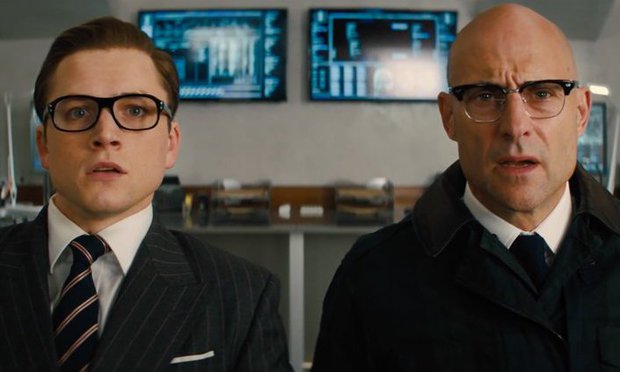
Many of the bigger shocks in The Golden Circle have already been revealed in trailers, so I don’t feel like I’m spoiling much by saying that the plot-wire here is tripped after the Kingsmen are targeted for destruction by a new enemy, leaving Eggsy and Merlin to flee to America to seek out their counterparts the Statesmen, as dictated by “doomsday protocol.” There they meet an all-star American cast: Channing Tatum, Halle Berry, Jeff Bridges, and Pedro Pascal are their American mirrors, drinking whiskey instead of martinis and wearing fine denim instead of finely tailored suits. Even their super-weapons weapons are American—electrified lassos and massive shotguns, all of this maintained by fabulous amounts of wealth made in liquor production.
Substances are critical to the story of The Golden Circle, as an American villain steeped in ’50s-era Americana nostalgia introduces a fundamentally American form of villainy: the war on drugs. As the head of an international illegal drug ring, Poppy (Julianne Moore) is a chipper Martha Stewart-type if Martha Stewart was completely unhinged and created chaos and cruelty instead of crafts. Poppy has two fearsome robotic dogs, Bennie and Jet, and a plan to force the legalization of drugs on the world’s leaders. “Save lives, legalize,” she chirps, referring to the “disastrous prohibition” that has dominated culture and created police states for decades.
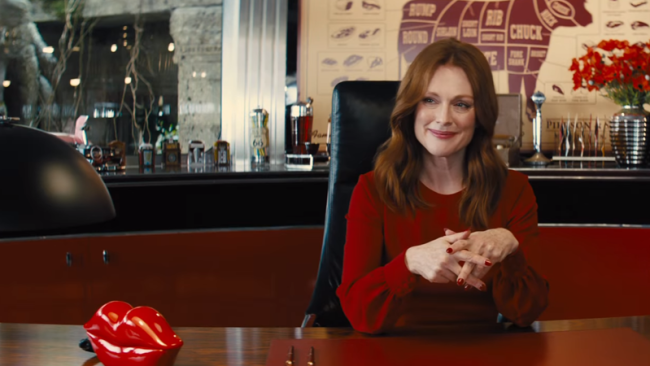
If movies are a reflection of their times and the unique concerns baked in of the moment, having drugs as the primary issue at the heart of The Golden Circle makes a lot of sense. America is ravaged by an opioid epidemic, and its effects are hardly unique or contained within our borders (Eggsy remarks on the amount of lives ruined in his London neighborhood). But the twist here is that The Golden Circle is far more critical towards the politicians who classify innocent people as “junkie scum,” lock them up, and throw away the key than it is on the taking of substances or the state of addiction.
It’s the failed war on drugs and the callous treatment of drug-users that is the true villain of The Golden Circle, and the social commentary therein was something I would never have anticipated from a film that’s billed as a comedic and comic-book-violent spin on Bond. In one scene, we see people herded into individual cages that are piled as high as the eye can see, perhaps the most cutting visual metaphor for mass incarceration and our prison industrial complex ever glimpsed in a big-tent action movie.
But most audiences aren’t buying a ticket to The Golden Circle for poignant debate about social issues. No, they’ll be in it for over-the-top fight scenes, violence so extreme it cheerfully winks at the absurd, and the emphasis on exquisite design, style, and costuming the first film made us accustomed to. On these counts, The Golden Circle more than delivers. It was born as a comic book, after all—with the first movie modeled on Mark Millar and Dave Gibbons’ graphic series—and herein you’ll see totally outlandish scenes come to life a hundred times over. (Millar and Gibbons are listed as executive producers, but the story is original this time.)
People will leap through the air, blood will spurt, much will explode, bodies will be sliced in half, bad guys will have robot arms. Set design is lush and vibrant, and all of the clothes and accessories worn will make you weep with envy, while you tap your foot to the kickass soundtrack of reworked classics. Dogs—both animal and robotic—are very important. And there’s enough comedic relief and timing that you’ll be laughing even as people are fed into meat grinders. The Golden Circle takes us to strange places.
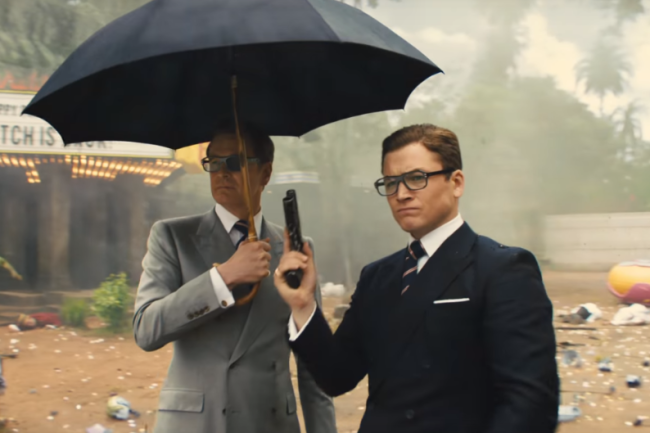
Another massive reveal already revealed in trailers is the return of Firth’s Harry Hart. How he’s returned I’ll leave to the movie, but it’s enough to say that Harry isn’t quite himself when he rejoins Merlin and Eggsy. With his memory of his former life gone, this Harry wants nothing of super spydom, reverting to what was once his childhood dream—lepidopterology, the study of butterflies.
Firth gives a graceful performance as a man who has lost the total confidence he oozed in the first film, and his moments of (re)connection with Eggsy are among The Golden Circle‘s finest. Watching them interact made me realize how infrequently we are shown supportive male friendships where two men are allowed to openly and vocally care for each other, and just how valuable this depiction is.
(When it gives, The Golden Circle also takes away; a would-be tough guy calls the well-dressed, one-eyed Harry “some faggot looking for an eye-fucking,” so let’s be clear that we’re not quite where we should be on social commentary. Even if the guy then gets what’s coming to him.)
Yet despite its relative success with male relationships, The Golden Circle still struggles with its treatment of women. Tilde now has a real part and earns some sympathy, but she’s also made to play a sort of stereotypical girlfriend role that doesn’t feel fresh—and there’s later reference made to her anal sex offer from the first film, as though Vaughn just couldn’t let it go even after so much time and blowback.
An interlude at a music festival creates a cringe-worthy extended set-up where Eggsy must perform sexual acts on another throwaway woman—who stands around in skimpy underwear—that is, once again, played for crude laughs. It will no doubt generate a lot of laughter in theaters, but I sat there thinking that Matthew Vaughn hadn’t learned any lesson from the Tilde fiasco after all. If anything, this scene is even more exploitative. It’s disappointing, to say the least, that we’re here again. The movie could have avoided this whole part entirely and still more than succeeded, but it went there anyway. What happens in Glastonbury doesn’t stay there, though The Golden Circle tries to convince us otherwise.
Luckily, there’s enough fun to be had with the rest of the movie that this scene didn’t spoil the whole experience for me, as was rather the case with the original Kingsman. And the performances are top-notch, with Pedro Pascal (Game of Thrones, Narcos) emerging as the undisputed breakout. I have “PEDRO PASCAL!!!” written in my notes about a dozen times, with many lines drawn underneath the name to underscore it.
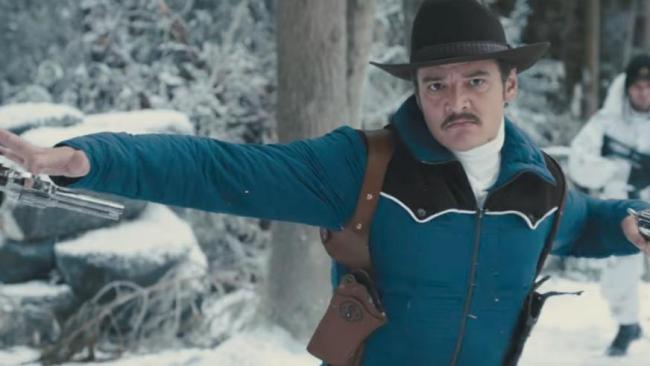
As Statesman senior Agent Whiskey, Pascal is vibrant, buoyant, by turns sly and soft, and he and will always keep you guessing. Also excellent is Halle Berry as the Statesman’s Merlin, Ginger Ale, a tech genius who dreams of going into the field. If you’ve forgotten that Halle Berry won a Best Actress Oscar, you’ll be reminded here as the stunning actress disappears into an understated and brilliant turn as a super-nerd.
Taron Egerton’s Eggsy does the heavy lifting in almost every scene, and though he sometimes looks on the verge of laughter when he shouldn’t be, Egerton is too likable to fault for looking like he’s having fun at work. And as the wise Merlin, the stalwart Mark Strong turns out to be the beating heart of The Golden Circle.
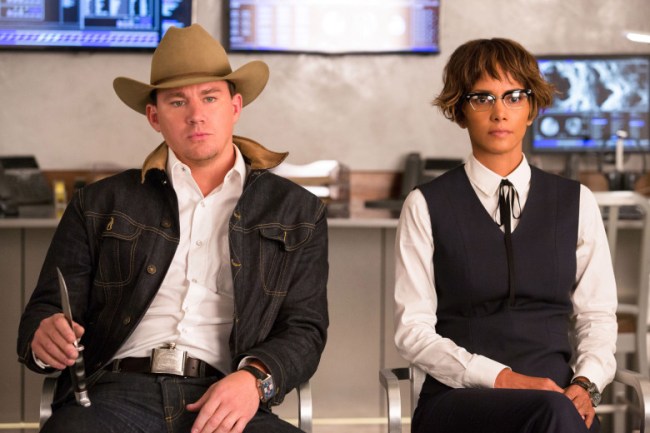
Surprisingly underutilized considering his top promotional billing is the tobacco-spitting Channing Tatum in head-to-toe denim, though the film reveals a possible reason for this. And while Julianne Moore is masterful in any role and delightedly chews the scenery as Poppy, the character is oddly underbaked considering the amount of time we spend with her. I would’ve loved to have seen her origin story. Her best moments come when she is paired up with a droll and very game Elton John, who plays, well, Elton John, Poppy’s celebrity prisoner who performs his hit songs on cue in full flamboyant stage costume to overlay the action sequences. It’s the kind of cheeky gag that only Kingsman could get away with, and John steals every scene he’s in.
Ultimately, The Golden Circle has some real flaws that are hard to shake, but its fantastic cast is so far above reproach that they can get away with murder. It’s hard to imagine a more thorough way to kill all of your braincells in an evening, if you’re into that sort of thing. And its unexpected commentary on corrupt politicians and cruelly failed policies make the movie much smarter than its slick and shiny surface would at first suggest. I enjoyed it, and even shed a tear or two—you’ll know the scene when you see it—and the investment and affection that I feel for these characters the second time around is proof that they’re doing something right.
The Golden Circle will be deservedly successful, and will no doubt earn a third go-round. If Kingsman‘s creatives listened just a little more attentively to the concerns and feedback from their audience, next time we might get a movie that didn’t make me scribble “oh but really?” almost as many times as I wrote “PEDRO PASCAL!”
(images: 20th Century Fox)
Want more stories like this? Become a subscriber and support the site!
—The Mary Sue has a strict comment policy that forbids, but is not limited to, personal insults toward anyone, hate speech, and trolling.—



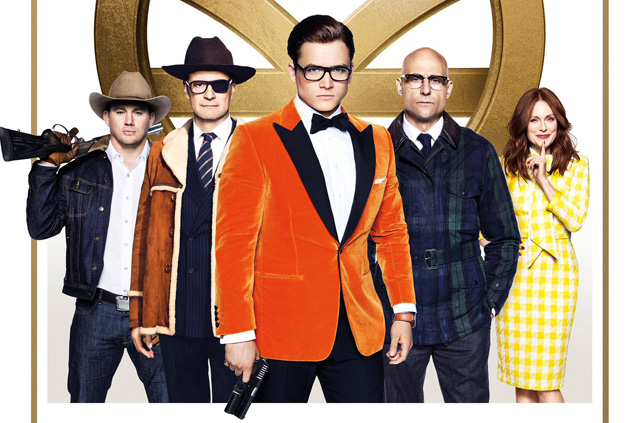






Published: Sep 18, 2017 05:00 pm